2015 Local Labor News
Click on link for past labor news articles: 2006 | 2007 | 2008 | 2009 | 2010 | 2011 | 2012 | 2013 | 2014 | 2016 | 2017 | 2018 | 2019
Published Oct 26, 2015 in www.komonews.com
Everett Residents Nervous About Possible Fire Department Cuts
By Mark Miller
 An efficiency report requested by members of the Everett City Council is raising concerns among residents, even though council members say they are months away from even considering specific recommendations.
An efficiency report requested by members of the Everett City Council is raising concerns among residents, even though council members say they are months away from even considering specific recommendations.
The report was conducted by the Missouri consulting firm of Finch and Associates and cost the city more than $60,000.
The preliminary suggestions include reducing the number of firefighters on staff and assigning fewer personnel at night when 911 call volumes are lower.
The report also raises the possibility of hiring a private ambulance service to respond to non-life-threatening medical calls instead of dispatching a firetruck and crew.
Another potential cost-savings measure could be closing two of the city's six fire stations. Read entire article
Posted Oct. 27, 2015 in www.huffingtonpost.com
Students in Debt, Professors in Poverty -- What's Going Wrong?
By Laurie Jones
The fight for a living wage has been a hot-button issue over the past 5 years and will certainly be a talking point in upcoming presidential elections. In a time when college enrollment is booming and college tuition is at an all-time high, the prospect of getting an upper-level degree and working at a college or university would seem like a sure bet for anyone. And yet, in 2015, a PhD does not guarantee a great living. In fact, it doesn't guarantee you will be able to get by at all. Read entire article
Published Oct. 25, 2015 in www.businessinsider.com
Labor Unions Aren't Just Helpful — They Might Be 'Necessary'
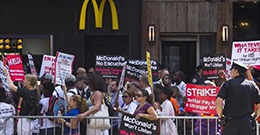 Through boom and bust, the American worker has been faced by two trends over the past few decades: the percentage of workers that are members of labor unions has decreased and the American middle class has slowly been hollowed out.
Through boom and bust, the American worker has been faced by two trends over the past few decades: the percentage of workers that are members of labor unions has decreased and the American middle class has slowly been hollowed out.
According to four researchers — Richard Freeman at the National Bureau of Economic Research, Eunice Han at Wellesley College, and David Madland and Brendan V. Duke at the Center for American Progress — the two trends are closely connected.
"The evidence in this paper shows that parents' unionism has a significant relationship with their offspring's well-being," wrote the researches in a paper from the NBER. Read entire article
China: If They Pull the Plug, We're Screwed
 One of the most dangerous low-level conflicts in the world right now is the fight over the South China Sea, and if a war breaks out there, it could tank the American economy.
One of the most dangerous low-level conflicts in the world right now is the fight over the South China Sea, and if a war breaks out there, it could tank the American economy.
Just in case you’re unfamiliar with the intricacies of East Asian geopolitics, here’s a little refresher as to what’s going on: After decades of more or less peaceful coexistence with its neighbors, China has, over the past few years, started to stake its claims to the waterways off its southern coast.
The problem, though, is that China isn’t the only country with claims to the South China Sea -- Vietnam, Malaysia, Brunei, and the Philippines also claim parts of this strategically important body of water as their own. But the Chinese are doing everything in their power to make sure they’re the top dogs in the region.
They’ve even gone so far as to build fake island chains by dumping billions of tons of dirt on top of reefs and in shallow waters so that they can then declare that "new land" as Chinese territory and use it to strengthen their maritime claims.
America, which has its own strategic interests in the region as well as mutual defense pacts with the Philippines and Japan, has tried to keep China in check, but so far this hasn’t done much. Read entire article
 Published 5/29/2015 in Aljazeera America
Published 5/29/2015 in Aljazeera America
Unions Divide Labor Movement over LA Minimum Wage Exemptions
Proposal to waive minimum wage for unionized shops divides labor activists and supporters
by Ned Resnikoff
Unions fought for the recently passed $15 minimum wage in Los Angeles. Now they’re asking that it not apply to their members, exposing a fault line in the labor movement.
The executive secretary-treasurer for the Los Angeles County Federation of Labor — a local affiliate of the AFL-CIO, America’s biggest labor federation — said Tuesday that the new minimum wage law should not pertain to workers covered by a union collective bargaining agreement. Read entire article
Published 4/24/15 in IAM751.org
NLRB sets Union Vote for Cadence-Giddens in Everett
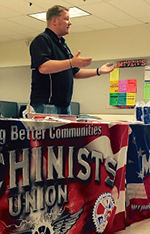 EVERETT – Workers at Cadence Aerospace-Giddens in Everett are scheduled to vote May 14-15 on whether to join the aerospace machinists union.
EVERETT – Workers at Cadence Aerospace-Giddens in Everett are scheduled to vote May 14-15 on whether to join the aerospace machinists union.
The National Labor Relations Board ordered the election after Machinists Union District Lodge 751 submitted signed requests from a substantial number of workers at the company.
“Cadence corporate has contracts with its suppliers and its customers,” said IAM 751 Organizer Director Jesse Cote. “Cadence-Giddens workers deserve the same consideration. They deserve a fair shake.”
The election is scheduled to take place over two days, with voting May 14 at both Cadence-Giddens plants in Everett – one at the Bomarc Business Park near Paine Field and the other on Merrill Creek Parkway. Voting will continue May 15 at the Bomarc plant.
The process will be overseen by the NLRB. If a simple majority of the workers who vote approve, they will form a new bargaining unit within District 751.
There are about 250 hourly workers at the company’s two Everett plants who produce precision machined aerospace components, subassemblies and kits, and do sheet-metal forming. The company has petitioned to have a number of those workers excluded from the bargaining unit; the union objects and a hearing on that will take place after the vote.
Unions Seek to Derail Fast Track
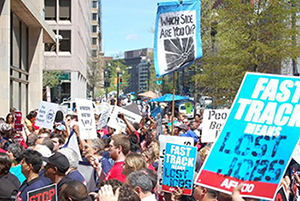 Unions are standing up and shouting “hell no!” to a trade agreement that can only be voted up or down, preventing lawmakers from ensuring that good-paying American jobs are not lost to countries offering cheap labor.
Unions are standing up and shouting “hell no!” to a trade agreement that can only be voted up or down, preventing lawmakers from ensuring that good-paying American jobs are not lost to countries offering cheap labor.
The voices of labor are loud and clear. On April 20, hundreds of union members marched from the AFL-CIO to the Office of the U.S. Trade Representative to press their case against fast-tracking the Trans-Pacific Partnership (TPP), a trade deal with a dozen other countries that make up 40 percent of the world’s economy. AFL-CIO Pres. Richard Trumka, testifying before the Senate Finance Committee, and other national labor leaders joined members of Congress in calling on lawmakers to oppose the deal.
The previous week, on April 15, more than 1,000 union members and allies crowded a park near Capitol Hill to voice their opposition to fast-tracking TPP, which the Obama administration wants to push through Congress on what is known on Capitol Hill as the “fast track.” It is a way of crafting trade deals without allowing members of Congress to amend them before they go into effect, even if they are not in our country’s best interest.
AFSCME Pres. Lee Saunders recently explained labor’s opposition to TPP, now being debated in Congress. “We cannot create better trade agreements until we get our priorities straight,” he said. “These priorities should include lifting wages, protecting workers, environmental and safety standards, and enforcing workers’ rights. Unfortunately, TPP will be no different than previous trade agreements that ignore these priorities and approach trade the same old way: by focusing on corporate goals and giving special rights to corporations at the expense of workers and consumers.”
A major union-sponsored advertising campaign coincided with this week’s activities. “These ads, which follow months of rallies, congressional meetings and unprecedented grassroots activities, will remind politicians that the trade debate is enormously important to working families,” Trumka said.
On April 30, during the AFL-CIO’s annual May Day Rally, union leaders once again will demand that Congress get off the fast track. Help us spread the word. Tell Congress: Stop the fast-track train wreck!
Published March 30, 2015 at king5.com
Teachers Square Off Over Evaluation Bill
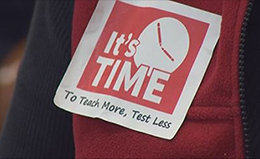 SEATTLE - More than 300 people signed up to testify Monday at a House Education Committee hearing on a bill that would require school districts to consider student test scores as a factor in teacher evaluations.
SEATTLE - More than 300 people signed up to testify Monday at a House Education Committee hearing on a bill that would require school districts to consider student test scores as a factor in teacher evaluations.
Math teacher Andi Nofziger-Meadows told lawmakers teachers are willing to be evaluated on student growth, but not by relying on results to standardized testing.
"There's no research showing that it's fair, valid or reliable," she said.
While the union opposes the bill, several teachers testified in favor of it.
"This bill isn't requiring our students to be perfect, it's holding my colleagues and myself accountable to the growth of every student," said Evin Chinn, a social studies teacher from Seattle's Cleveland High School.
Although the testimony that was heard during the meeting on Monday in Olympia was evenly split between pro and con comments, hundreds more wanted to speak against the bill but there wasn't enough time.
The proposal passed the Senate two weeks ago with bipartisan support but is expected to face a difficult climb in the House. No vote has been scheduled in the House committee even though Wednesday is the deadline for policy bills to be voted out of committee.
The proposal could help Washington state regain the state's waiver from some parts of the federal No Child Left Behind education law.
Published 3/9/15 in Politico.com
Biden: Labor Opponents Looking for 'Blackshirts' to Break Unions
Published March 21, 2015 at www.thestand.org
By Ben Schreckinger
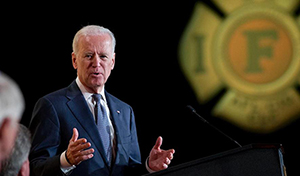 Vice President Joe Biden hit opponents of organized labor in remarks to a firefighters union on Monday, invoking a term closely associated with interwar European fascism in describing those who are “intent on breaking” unions.
Vice President Joe Biden hit opponents of organized labor in remarks to a firefighters union on Monday, invoking a term closely associated with interwar European fascism in describing those who are “intent on breaking” unions.
Biden denounced those blocking the National Labor Relations Board’s attempts “to enforce the basic rules of the road,” saying, “They’re not looking for striped shirts, guys. They’re looking for blackshirts, not referees.”
The blackshirts were paramilitary forces loyal to the Italian fascist leader Benito Mussolini. Labor unions were among their targets.
Speaking at a conference of the International Association of Fire Fighters in Washington, Biden said that firefighters and their unions used to have bipartisan support but that the Republican Party had changed.
“Republican governors and others around the country are saying you’re the problem,” said Biden.
“There is a concentrated, well-organized, well-paid, well-funded effort to undermine organized labor in the United States of America, and they’ve been remarkably successful,” he added. “Because they know without you, it’s a clear shot for whatever they want. That’s why they’re so intent on breaking you and diminishing your voice.”
Biden’s remarks came the same day that Scott Walker, the governor of Wisconsin and a potential GOP presidential candidate, signed right-to-work legislation into state law.
http://www.politico.com/story/2015/03/joe-biden-blackshirts-unions-115897.html
Community Rallies at Tesoro; Contract Vote Set
ANACORTES -- More than 100 union members and community supporters rallied Saturday in support of Tesoro Anacortes oil refinery workers who have been out on strike since Feb. 1. At the rally, local negotiators for the United Steelworkers union (USW) said that a tentative agreement was reached Friday on terms for returning to work. Refinery workers will vote on Monday, March 23 and the union is recommending ratification of the deal.
I can’t explain how much it means to us to have so much labor and community support,” said Ryan Anderson, Unit Chairman of USW Local 12-591 who served as lead negotiator at the local bargaining table. “This wasn’t a fight we wanted, it was a fight they picked with us.”
On March 12, the USW announced a tentative agreement on a new four-year contract with Shell Oil as a pattern agreement for the rest of the industry. The proposed deal reportedly includes annual wage increases and contains language addressing the USW’s safety concerns about worker fatigue and performance of routine maintenance by contractors rather than union members. Read entire article
Published March 16, 2015 in mynorthwest.com
Machinists Union Seeks Election at South Carolina Boeing Plant
CHARLESTON, S.C. (AP) — The machinists union on Monday asked for an election so about 2,500 Boeing production workers in South Carolina can decide whether they want union representation.
Under National Labor Relations Board rules, 30 percent of the workers in a potential union bargaining unit must sign authorization cards for an election to be held, said Frank Larkin, spokesman for the International Association of Machinists & Aerospace Workers.
"We are confident we have achieved the minimum requirement and now the board will determine the exact number of people eligible to vote and then they will set and conduct the election," he said.
The exact number of those who signed authorization cards is not released, he said.
Boeing now employs about 7,500 people in South Carolina. Larkin said the union vote would pertain to production workers, about 2,500 of them, who assemble the company's 787 Dreamliner.
Boeing officials did not immediately respond to an email seeking comment. Read entire article
Published Feb. 28, 2015 in gulfnews.com
U.S. Unions Back to Flexing Their Muscles
There could be a sharp increase in labor disputes as they reassert themselves.
By Keith Naughton, Lynn Doan and Jeff Green
After years of avoiding confrontation, the US labour movement is reasserting itself. From the ports of Los Angeles to the car plants of Detroit, unions are demanding payback for sacrifices they say helped revive the economy.
Oil workers have walked off the job for higher wages and better working conditions. Dock workers have snarled West Coast ports. Personnel staffing oil terminals at the Port of Long Beach, California, are threatening to strike. In Detroit, union leaders girding for contract talks this year will push for the first raise veteran autoworkers have received in a decade.
Union leaders are taking advantage of a tightening labour market and favourable political environment. With middle-class wages stagnating and the rich getting richer, income inequality has become a rallying cry for Democrats and Republicans alike. Reviving opportunity for all resonates with Americans who feel left out as growth picks up and the market notches record highs. Read entire article
Published in kuow.org on Tuesday, February 2, 2015
New Households in King County are Rich or Poor -- But Not Middle Class
By Carolyn Adolph
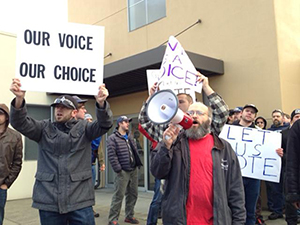 Earlier this month at an economic conference, King County Executive Dow Constantine made a startling point: Less than 5 percent of the households added to King County since the year 2000 were middle income.
Earlier this month at an economic conference, King County Executive Dow Constantine made a startling point: Less than 5 percent of the households added to King County since the year 2000 were middle income.
Middle income means having a household income of $35,000 to $125,000 a year.
It's a wide salary range, but fewer than 4,000 new families in the county could fit it. And of the other households, there were slightly more poor families than richer families. Despite Seattle’s strong economic recovery, the middle class is struggling to get and keep a foothold.
Here are some reasons why:
Structures that protect middle income earners – like unions – are breaking down. For example, the local Machinists. Boeing has traditionally had a solid middle class workforce. The company pension was its cornerstone - a guarantee of security.
Then just over a year ago, Boeing threatened to axe 20,000 local jobs unless workers agreed to give it up. In the weeks before the final vote, two generations of workers argued over what form of security was more important: the pension or the jobs. You could hear the old solidarity falling apart.
Machinist Billy Cox said the young generation didn’t understand the value of keeping what the union had fought for.
“In my opinion we became complacent, that is why we are falling back now,” he said. “And hopefully, seeing the minimum wage people struggle will give us a snapshot – ‘Hey, we could be there one day too.’”
The Machinists’ new president, Jon Holden, said the union's job is even more difficult today – because the employer played hardball.
“We were negotiating during the life of an agreement, so that’s new tactics,” Holden said. “We have to prepare our members for that again.” Read entire article